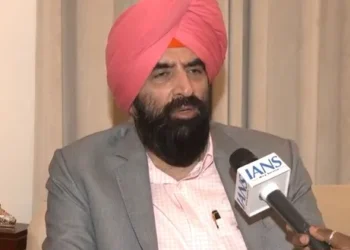UN Secretary-General Antonio Guterres is taking a sort of victory lap in Ukraine to celebrate the one small breakthrough for the UN, which has been crippled by vetoes from acting on Russia’s invasion of that country.
While visiting Lviv in Ukraine, Guterres on Thursday declared that the agreement to allow the export of Ukrainian foodgrains “reflects a victory for diplomacy”.
It will help “vulnerable people in every corner of the world,” he told reporters in Lviv, noting that global “wheat prices dropped by as much as eight per cent following the signing of the agreements”.
The UN chief worked relentlessly for what the UN proudly calls the Black Sea Grain Initiative by getting Russia, Ukraine and Turkey to create a safe passage for ships to resume Ukraine’s foodgrain exports.
The arrangement reached in July also increased the profile of Turkey’s President Recep Tayyip Erdogan, who has emerged as the interlocutor between Russia and Ukraine, and whose country plays a key role in facilitating the exports through its Straits of Bosphorus.
Guterres, who met with Erdogan and Ukrainian President Volodymyr Zelensky in Lviv on Thursday, saw the diplomacy behind the grain initiative as a roadmap for ending the war.
“The parties have worked professionally and in good faith to keep the food flowing,” he said while appealing to them “for this to continue overcome all obstacles in a spirit of compromise and permanently settle all difficulties”.
“In less than one month, 21 ships have departed from Ukrainian ports and 15 vessels have left Istanbul for Ukraine to load up with grain and other food supplies,” the UN chief said.
“As we speak, more than 5,60,000 metric tonne of grain and other food produced by Ukrainian farmers is making its way to markets around the world,” he added.
He is scheduled to visit the port in Odessa, which had been attacked by Russia, to see for himself the resumption of exports.
The agreement came after every effort at the UN Security Council on Ukraine — to even condemn the invasion — was vetoed by Moscow showing up the UN’s impotence on a matter of global importance and boosting scepticism about the UN’s relevance.
While the UN General Assembly has condemned the Russian invasion, unlike the Council it is powerless to act on it.
The attacks on Ukrainian ports and the mines in the Black Sea from the conflict had blocked foodgrains exports from that country, imperilling the global food situation.
Because Ukraine accounts for more than 10 per cent of global wheat exports, more than 15 per cent of corn and nearly 20 per cent of barley, food prices had shot up around the world while many developing countries faced the spectre of imminent hunger.
“A record 345 million people in 82 countries are now facing acute food insecurity while up to 50 million people in 45 countries are right on the edge of famine and risk being tipped over without humanitarian support”, the World Food Programme (WFP) has warned.
The WFP started the first humanitarian shipment from Ukraine this week sending 23,000 tonne of wheat to countries in the Horn of Africa.
Under the Black Sea Initiative agreements, the ships carrying foodgrains are monitored by a Turkey-based Joint Coordination Centre with the participation of the UN and the three countries.
Erdogan, who had hosted unsuccessful talks between Ukraine and Russia in March but worked with Guterres on the foodgrain export agreement, said in Lviv that he believed that the war would eventually end at the negotiating table and that Zelensky and Guterres “are actually of the same opinion,” according to the Turkish President’s Office.
Offering to be a mediator, the Turkish President said, “It is all about finding out the shortest and fairest pathway to the negotiating table.”
He added that he would brief Russia’s President Vladimir Putin on Thursday’s discussions with Guterres and Zelensky.























